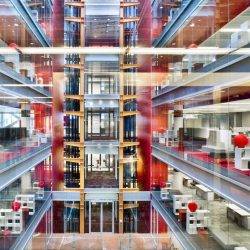June 14, 2017
Job polarisation is being driven by lack of access to technological skills, warns OECD 0
 The employment rate throughout OECD areas is finally returning to pre-crisis levels, but people on low and middle incomes have seen their wages stagnate and share of middle-skilled jobs fall. This is according to the latest OECD Employment Outlook 2017 which finds that the employed share of the population aged 15 to 74 years rose for the third consecutive year, and is expected to reach 61.5 percent by the end of 2018, above its peak of 60.9 percent in the fourth quarter of 2007. Its projections for the UK’s economy for 2017-18 anticipate that growth will ease as rising inflation weighs on real incomes and consumption, but business investment will weaken amidst uncertainty about the United Kingdom’s future trading relations with its partners.
The employment rate throughout OECD areas is finally returning to pre-crisis levels, but people on low and middle incomes have seen their wages stagnate and share of middle-skilled jobs fall. This is according to the latest OECD Employment Outlook 2017 which finds that the employed share of the population aged 15 to 74 years rose for the third consecutive year, and is expected to reach 61.5 percent by the end of 2018, above its peak of 60.9 percent in the fourth quarter of 2007. Its projections for the UK’s economy for 2017-18 anticipate that growth will ease as rising inflation weighs on real incomes and consumption, but business investment will weaken amidst uncertainty about the United Kingdom’s future trading relations with its partners.
















 Most FMs would tell you that the state of the workplace toilets is often one of the main determinants by occupants on how well the facilities department is doing its job. So it’s disturbing to learn that according to a new survey a significant number of employees have cause to complain about the state of their workplace toilet facilities. The research, carried out by the Association of Plumbing & Heating Contractors claims that 16.5 percent of people are unhappy at work due to the condition of their employer’s toilets which is having a negative impact on their levels of engagement. Their research found 43.8 percent of the people surveyed felt their workplace toilets needed to be better maintained. And when asked if their workplace toilets require updating or refurbishing, 44.4 percent said they did. London seemingly has the worst workplace toilets with 50.9 percent of workers surveyed believing they need to be better maintained and require refurbishing.
Most FMs would tell you that the state of the workplace toilets is often one of the main determinants by occupants on how well the facilities department is doing its job. So it’s disturbing to learn that according to a new survey a significant number of employees have cause to complain about the state of their workplace toilet facilities. The research, carried out by the Association of Plumbing & Heating Contractors claims that 16.5 percent of people are unhappy at work due to the condition of their employer’s toilets which is having a negative impact on their levels of engagement. Their research found 43.8 percent of the people surveyed felt their workplace toilets needed to be better maintained. And when asked if their workplace toilets require updating or refurbishing, 44.4 percent said they did. London seemingly has the worst workplace toilets with 50.9 percent of workers surveyed believing they need to be better maintained and require refurbishing.






 One in seven SME employees admit to feigning illness and taking at least three bogus sick days off each year in order to cope with a culture which expects them to be available all the time. Nearly half (42 percent) of staff who are pulling sickies do so because they need a rest as just under half (46 percent) of SME employees bother to use up their full holiday allowance. At the end of 2016, SMEs employed 15.7 million people and accounted for 99 percent of all private sector businesses. Due to the piling pressure on small business owners, half (51 percent) of the 1,500 British SME workers and business owners who were polled by breatheHR confessed to contacting an employee while they were on sick leave – this number jumps to 72 percent for younger business owners (18-34-year-olds) showing clear generational differences. Additionally, three-quarters (71 percent) of business owners would expect employees to work if they had a common cold. Why? Because absenteeism impacts the bottom line – 85 percent of business owners say it has an economic effect.
One in seven SME employees admit to feigning illness and taking at least three bogus sick days off each year in order to cope with a culture which expects them to be available all the time. Nearly half (42 percent) of staff who are pulling sickies do so because they need a rest as just under half (46 percent) of SME employees bother to use up their full holiday allowance. At the end of 2016, SMEs employed 15.7 million people and accounted for 99 percent of all private sector businesses. Due to the piling pressure on small business owners, half (51 percent) of the 1,500 British SME workers and business owners who were polled by breatheHR confessed to contacting an employee while they were on sick leave – this number jumps to 72 percent for younger business owners (18-34-year-olds) showing clear generational differences. Additionally, three-quarters (71 percent) of business owners would expect employees to work if they had a common cold. Why? Because absenteeism impacts the bottom line – 85 percent of business owners say it has an economic effect.










June 14, 2017
Workplace wellbeing is now embedded in the very bricks and mortar of the building 0
by Sion Davies • Comment, Wellbeing, Workplace design
(more…)